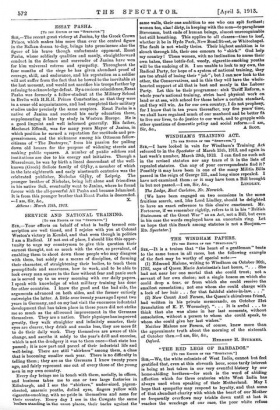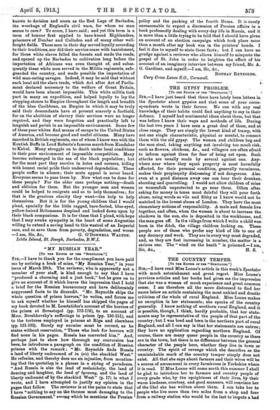"THE RED LEGS OF BARBADOS."
1 TO THE EDITOR 07 THE "SPECTATOR."]
SIR,—We, the white colonists of West India, cannot but feel gratified that, even at this eleventh hour, some tardy interest is being at last taken in our very eventful history by our home-abiding brethren—for such is the word of abiding affection which for three centuries white West India has always used when speaking of their Motherland. May I hope that sympathy may respond to loyalty, and that some of that abundant charity with which the heart of our Mother so frequently overflows may trickle down until at last it reaches the wreckage of our race, the poor white refuse-
kncivin to derision and scorn as the Red Legs of Barbados, the wreckage of England's civil wars, for whom no man seems to care ? To scorn, I have said ; and yet this term is a term of honour first applied to bare-kneed Highlanders, prisoners of Dunbar and Culloden and of many other well. fought fields. These men in their day served loyally according to their traditions, nor did their service cease with banishment, for these white slaves felled the forests and made the roads, and opened up the Barbados to cultivation long before the importation of Africans was even thought of, and subse- quently these white men served in the Militia regiments, safe- guarded the country, and made possible the importation of wild man-eating savages. Indeed, it may be said that without such local aid the slave trade, which Act after Act of Parlia- ment declared necessary to the welfare of Great Britain, would have been almost impossible. This white militia took part in many an expedition, and helped loyally to lay the stepping-stones to Empire throughout the length and breadth of the blue Caribbean, an Empire in which it may be truly said their descendants have at present scarcely a foothold, for on the abolition of slavery their services were no longer required, and they were forgotten and practically left to languish and perish in an impossible environment. Some few of these poor whites find means of escape to the United States of America, and become good and useful citizens. Many have marched in British regiments, one of whom I know was with the Kentish Buffs in Lord Roberts's famous march from Kandahar to Kabul. Many struggle on to death under local conditions in their poor environment of impossible competition. Many become submerged in the sea of the black population ; but for the most part they survive in holes and corners, hiding with honest racial pride their undeserved degradation. These people suffer in silence ; their mute appeal is never heard. Everyone seems to pass them by. Now what can be done for these people ? For the older ones perhaps nothing—death and oblivion for them. But the younger men and women could be helped to emigrate and so to help themselves ; for that is the gracious charity they want—the help to help themselves. But it is for the young children that I would plead, specially for the little ragged, bare-footed, blue-eyed, yellow-haired Britonesses despised and looked down upon by their black companions. It is for these that I plead, with hope that I may awake sympathy in the heart of some Augustine willing to extend a saving hand to this wastrel of an Imperial race, and so save them from poverty, degradation, and worse.















































 Previous page
Previous page